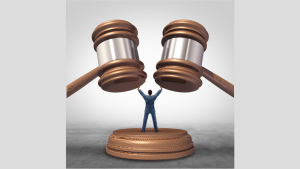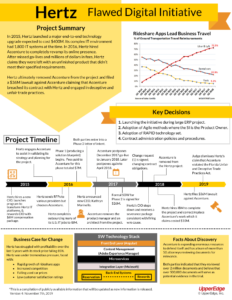- John Belden
- Reading Time: 4 minutes

If you’ve followed the saga of Hertz vs. Accenture, you know that the surprises aren’t over. To quickly get you up to speed, in April 2019, Hertz filed a lawsuit against Accenture claiming that Accenture delivered a flawed product, exhibited extortionist-like behavior to fix it, and in general, breached its contracts with Hertz. In its amended lawsuit on June 20th, Hertz took aim at Accenture’s talent and trashed the team that was working on the Hertz program.
On July 15th, Accenture delivered their response to the lawsuit, providing quite logical responses to some of their claims.
Fast forward to the past month and we can start to peel back layers of the onion. These five new actions prove the mudslinging won’t go on forever.
Development #1: Judge Throws Out Part of the Case Against Accenture
Hertz initially filed two claims against Accenture.
- The first claim was for Breach of Contract that implied that Accenture did not deliver its services in a ‘workman-like’ manner.
- The second claim alleges that Accenture violated the Florida Unfair and Deceptive Trade Practices Act. In this second claim Hertz suggests that Accenture misrepresented the quality of the skillset of the team they would apply to the program. Specifically, Hertz identified that Accenture recommended an IT productivity product called RAPID on the presumption that Accenture had significant skills with this product.
On October 25th, the judge from the 2nd District of New York dismissed the second claim outright indicating that Hertz had failed to provide any specific documentation regarding Accenture’s claim on specific expertise regarding RAPID.
Lesson: If your vendor makes a claim, getting it in writing.
Development #2: Accenture is Now Likely to File a Counterclaim Against Hertz
Given the fact that the judge only threw out part of the case and Accenture lost its attempts to dismiss it in its entirety, there is a high probability that Accenture will file its own countersuit. Accenture indicated to the court on November 1st that it anticipated filing a counterclaim by November 22nd. While UpperEdge has no knowledge of what Accenture will allege in its countersuit, these suits typically take the form of Breach of Contract with the implication that the vendor is owed payment for services delivered. It is not clear at this point if Accenture will seek other damages.
Lesson: If you plan on suing your vendor, be prepared to defend yourself.
Development #3: Accenture is Expending Enormous Resources to Defend Itself
In a September case status update, the parties indicated that they had reviewed over two million documents to determine the relevance to the case. Both parties believe that the total number of documents that will serve as potential evidence in the trial will exceed 500,000. Accenture is also to be given access to Hertz’s code development and project tracking systems. Accenture stated in the case update that they have a team of more than fifty attorneys reviewing documents for relevance. With this level of effort being put forth by Accenture, it appears that more than the $35M in fees are at stake.
Lesson: If you are going to sue your vendor, you better be ready to open the kimono.
Development #4: IBM has Joined the Fracas
Following Accenture’s exit from the program, Hertz hired IBM to complete the project. Hertz is now putting limitations on the discovery process, indicating that providing Accenture access to the IT code and project management systems (JIRA and CONFLUENCE) would violate specific confidentiality agreements that Hertz has with IBM. IBM claims that the systems include documentation regarding IBM’s business processes related to testing, development and team ceremonies that IBM claims are unique to its conduct of business. Accenture claims that it requires access to these systems in order to appropriately defend its position regarding breach of contract and the quality of work. The decision of how to proceed has now been left to the judge.
Lesson: IT intellectual property and proprietary business processes of 3rd parties will likely come in to play with any significant lawsuit of an SI.
Development #5: Scheduling Order Issued
Both parties have agreed to the judges scheduling orders which provides the following milestones:
January 30th, 2020 Both parties exchange initial expert disclosures
February 13th, 2020 Both parties complete fact discovery
May 8th, 2020 Parties complete expert discovery
May 29th, 2020 Pre-trial conference with the judge
If there is one thing I’ve learned from following these lawsuits, it’s that these cases typically take much longer then the project itself. The Bridgestone vs. IBM case took nearly four years and the two parties settled a few days before the actual trial was to begin.
Lesson: Don’t plan your summer vacation around being in NY for this trial.
Related Posts
Related Blogs
Why You Are Accenture, Deloitte, IBM, and PwC’s #1 Priority—But Not in a Good Way
How Accenture’s Strategy Evolved in 2020
How 25,000 Accenture Layoffs Will Impact Customers
About the Author

